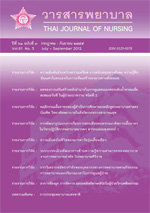ความสัมพันธ์ระหว่างความเครียด การสนับสนุนทางสังคม ความรู้สึกมีคุณค่าในตนเองกับภาวะซึมเศร้าของมารดาหลังคลอด
Main Article Content
Abstract
ผลการวิจัย พบว่า มารดาหลังคลอดส่วนใหญ่ร้อยละ 75 มีภาวะซึมเศร้า ร้อยละ 82.50 มีความเครียดสูงร้อยละ 70.62 ได้รับการสนับสนุนทางสังคมน้อย และร้อยละ 74.38 มีความรู้สึกมีคุณค่าในตนเองต่ำ มารดาหลังคลอดที่มีสัมพันธภาพกับสามีที่ดีมีโอกาสเกิดภาวะซึมเศร้าลดลง 0.212 เท่าของผู้ที่มีสัมพันธภาพไม่ดีกับสามี ส่วนผู้ที่มีความเครียดสูงมีโอกาสเกิดภาวะซึมเศร้าเพิ่มขึ้น 7.132 เท่าของผู้ที่มีความเครียดต่ำ และผู้ที่มีความรู้สึกมีคุณค่าในตนเองต่ำมีโอกาสเกิดภาวะซึมเศร้าเพิ่มขึ้น 5.587 เท่าของผู้ที่มีความรู้สึกมีคุณค่าในตนเองสูง อย่างมีนัยสำคัญทางสถิติที่ระดับ .05
Relationship between stress, social support, self-esteem and depression in postpartum mothers.
Lertsakornsiri, M., Boonyanurut, P., Deoisres, W., & Hisako, K.
The purposes of this descriptive research were to explore stress, social support, self-esteem and depression in postpartum mothers, and find the relationships between personal factors, stress, social support, self-esteem and depression in postpartum mothers. The samples consisted of 160 postpartum mothers who attended the postpartum clinic at King Narai Hospital and Banmi Hospital in Lopburi Province. The research tools were questionnaires that composed of 5 parts:1) personal data, 2) the perceived stress, 3) Rosenberg self-esteem, 4) the perceived social support and 5) depression. The reliabilities of part 2-5 were 0.72, 0.84, 0.77 and 0.95 respectively. The data were analyzed by using the descriptive statistics and Binary logistic regression.
The results revealed that 82.5 percents of postpartum mothers expressed stress at high level, 70.62 percents of them gained low social support and 74.38 percents had low self-esteem. Depression was founded in 75 percents of the postpartum mothers. Postpartum mothers who had good relationship with husband, decreased chance of having depression 0.212 times of those who had poor relationship with husband. Postpartum mothers who had high level of stress, increased chance of having depression 7.132 times of those who had low level of stress. Postpartum mothers who had low self-esteem, increased chance of having depression 5.587 times of those who had high self-esteem at statistically significant level .05.


